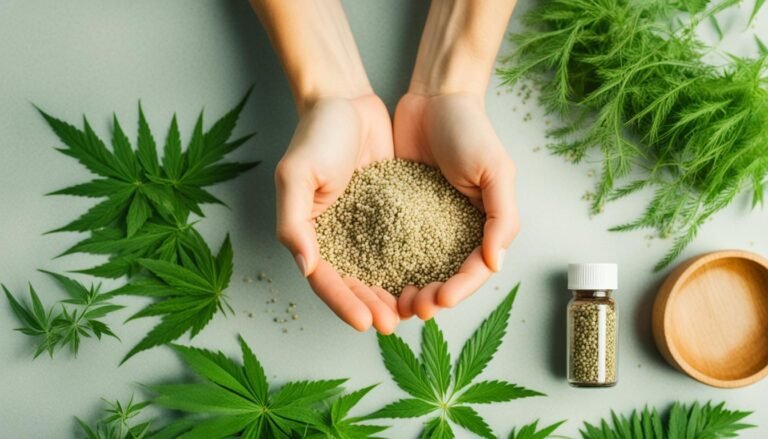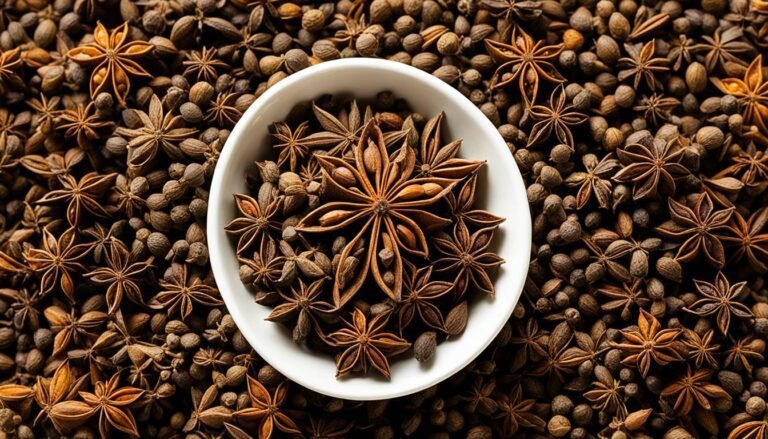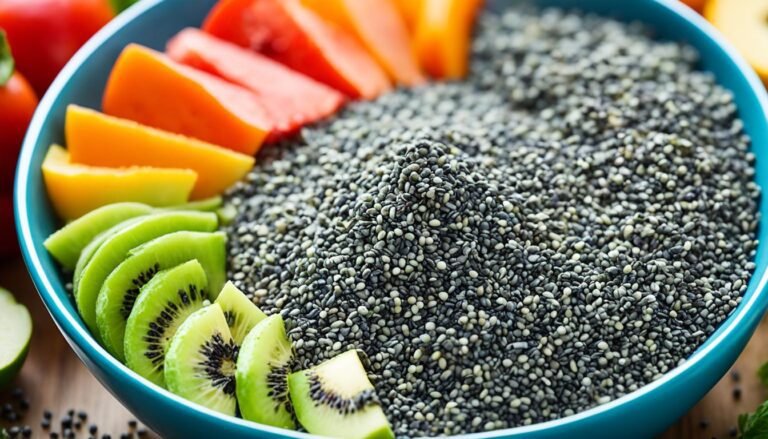Can You Have Fennel Seeds During Pregnancy? Answers

Are you an expectant mom wondering if fennel seeds during pregnancy are safe for you? Fennel, known as Foeniculum vulgare, is a common herb and spice. It’s also been used for health reasons, including during pregnancy. But, there are safety concerns and risks to think about. This article will look into fennel’s traditional use in pregnancy, its benefits and risks, expert advice, and how to use it safely while pregnant.
What is Fennel Seeds?
Fennel seeds come from the fennel plant (Foeniculum vulgare), a member of the carrot family. They taste and smell like licorice. People all over the world use them as a spice in cooking.
The fennel plant is from the Mediterranean and has been used for health for a long time. Its seeds are packed with good stuff like oils, antioxidants, fiber, and important vitamins and minerals.
Fennel Plant Description
The fennel plant grows up to 1.5 meters tall and has green, feathery leaves. It also has yellow flowers that look like umbrellas and bloom in summer. After the flowers, the seeds grow.
Fennel Seed Composition
Fennel seeds are full of nutrients, including:
- Volatile oils: They have over 87 different oils, like anethole and fenchone.
- Antioxidants: They have polyphenol antioxidants, such as rosmarinic acid and quercetin.
- Fiber: A tablespoon of fennel seeds has 2 grams of fiber.
- Vitamins and minerals: They are rich in calcium, potassium, magnesium, phosphorus, and vitamin A.
Fennel Seed Uses
Fennel seeds are used in many types of food around the world. They are a spice in Indian, Middle Eastern, and European cooking. You can use them whole or ground. They’re also made into teas, supplements, and essential oils, which can be good for your health.
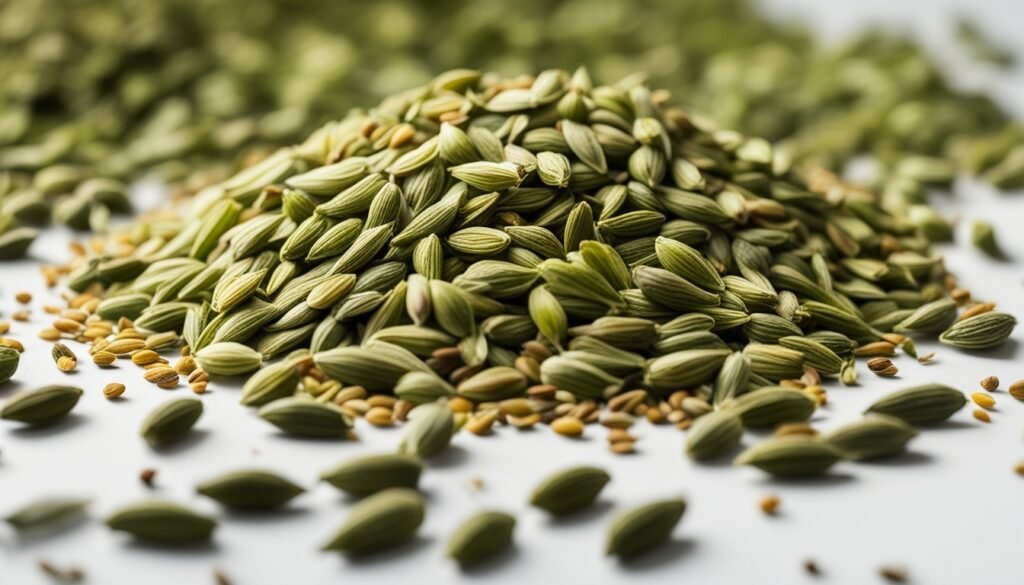
Fennel’s Traditional Use in Pregnancy
Fennel has been valued for its healing properties, especially for women’s health. It’s been used to ease menstrual cramps, balance menstrual cycles, and boost breast milk. These uses have made fennel a trusted remedy across cultures.
Fennel’s Reproductive Health Applications
Recent studies hint at fennel’s potential for managing PCOS and irregular periods. Its hormonal effects raise questions about its safety during pregnancy. This has sparked interest in its possible benefits and risks.
Fennel seeds are packed with 2.9 grams of fiber per tablespoon, helping with digestion and preventing constipation. Adults should aim for 2 to 3 grams or one tablespoon daily, says the USDA. They’re also full of vitamins and minerals like vitamin C, A, calcium, iron, and potassium, vital for health.
Fennel seeds can help control blood sugar by slowing glucose absorption and ease digestive issues with their antispasmodic properties during pregnancy.
But, pregnant women should be careful with fennel supplements and oil. They can cause uterine contractions, which may lead to miscarriage or early labor. Too much fennel can also cause allergic reactions, stomach problems, and hormonal imbalances.
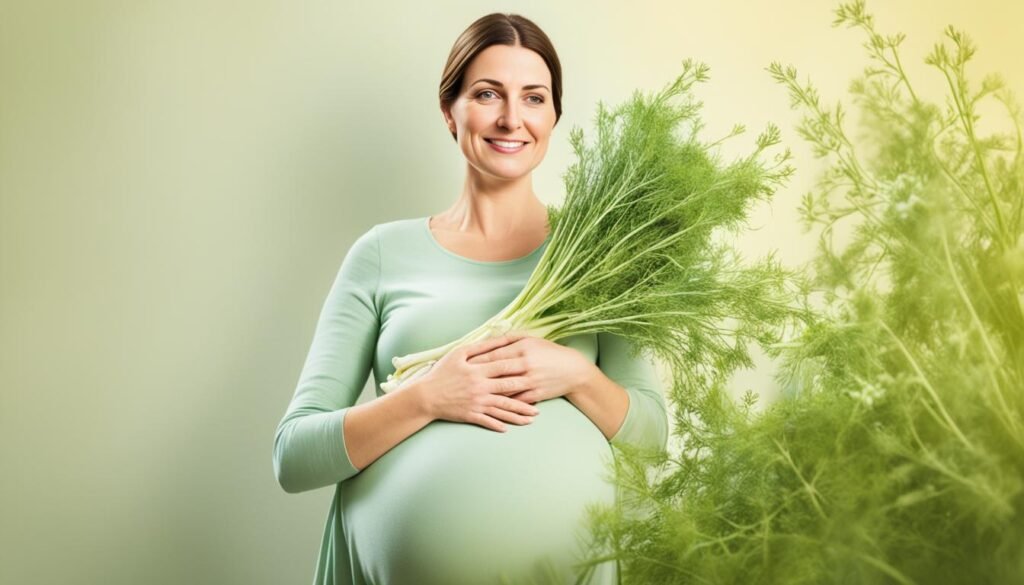
It’s crucial to talk to a healthcare provider before using fennel during pregnancy. They can help weigh the benefits and risks. By knowing about fennel’s traditional and modern uses, pregnant women can make safe choices for their health.
Safety Concerns with Fennel in Pregnancy
Fennel is usually safe when eaten in small amounts. But, there are some fennel safety concerns pregnancy that parents should know. It has compounds like estragole and fenchone. These could affect the uterus or hormones, possibly leading to issues like miscarriage or hormonal changes during pregnancy.
High doses of fennel might also affect pregnancy medicines. Fennel seed side effects during pregnancy could include thinner blood, dry skin, and more contractions. Be careful, especially in the first three months.
The USDA suggests pregnant women eat about 2 to 3 grams or one tablespoon of fennel seeds daily. Sticking to this amount helps avoid unwanted side effects.
It’s best to talk to a healthcare provider before eating fennel seeds while pregnant. This ensures safety and helps avoid problems. Choose organic fennel seeds to avoid harmful pesticides and chemicals.
Can You Have Fennel Seeds During Pregnancy?
Fennel seeds are not fully proven to be safe during pregnancy. They are usually safe in small amounts in food. But, using them for health reasons in the first three months of pregnancy might be risky. Women who are pregnant should talk to their doctor before taking fennel supplements or eating a lot of them. We don’t know how they might affect the baby.
It’s safer to use fennel in cooking, but avoid big doses or strong extracts without a doctor’s okay. Fennel seeds have fiber, vitamins, and minerals that are good for pregnant women. But, they can also make the uterus contract and change hormone levels. So, we need to be careful.
| Nutrient | Amount per Cup (87g) of Sliced Fennel |
|---|---|
| Calories | 27 |
| Fat | 0.2g |
| Sodium | 45mg |
| Carbohydrates | 6.3g |
| Fiber | 2.7g |
| Sugars | 3.4g |
| Protein | 1.1g |
It’s suggested to eat about 2 to 3 grams of fennel seeds or one tablespoon a day while pregnant. You can add a teaspoon of fennel seeds to your food for its digestive and anti-inflammatory benefits. But, eating too much can cause problems like vaginal bleeding, early contractions, and miscarriage.
Deciding to eat fennel seeds while pregnant should be talked over with a healthcare professional. They can give advice based on your health and how far along you are in pregnancy.
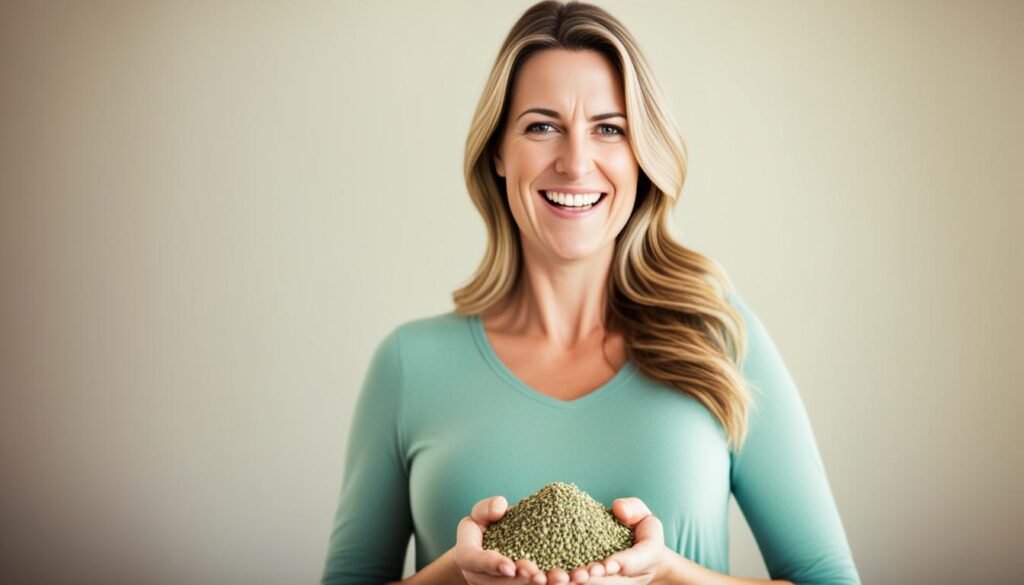
Fennel’s Impact on Menstruation and Hormones
Fennel is a versatile herb with a long history in traditional medicine. It has caught the eye for its possible effects on reproductive health and hormonal balance. Studies have looked into how fennel affects menstrual cycles and hormone levels.
Study on Fennel for Oligomenorrhea
A study showed that fennel-based tea helped women with infrequent periods. It worked as well as a progesterone drug. The fennel group also saw lower androgen levels, which are common in PCOS.
Study on Fennel for PCOS
Another study found that fennel tea eased menstrual pain and made periods more regular in women with PCOS. These results suggest fennel could help with menstrual issues and hormonal imbalances. It might be a natural choice for women looking for relief from irregular periods or PCOS symptoms.
Even though these studies show promise, the safety of fennel during pregnancy is still unclear. Pregnant women should talk to their doctors before using fennel.
The research on fennel’s benefits for reproductive health is encouraging. However, we need more studies to fully grasp its effects on menstruation and hormones. This includes understanding its use during pregnancy and managing PCOS.
Weighing the Risks and Benefits
Thinking about using fennel while pregnant means looking at both the good and the bad. Fennel has been used for a long time to help with women’s health. It might ease menstrual cramps, help with cycle regularity, and boost breast milk. But, it could also affect hormones, especially in the first three months when the baby grows the most.
Fennel is packed with nutrients that are good for you. It has 360 milligrams of potassium and 838 IU of vitamin A per cup. It also has selenium, which fights inflammation and can help prevent cancer. Plus, its vitamin C helps your body use iron better when you eat iron-rich foods.
But, there are risks to consider too. A 2018 study showed that eating too much fennel could lower your blood pressure. This could be a problem during pregnancy. Also, fennel affects hormones that control menstruation and PCOS, so it’s best to be careful, especially in the first trimester.
Until we know more about fennel’s effects during pregnancy, it’s best for pregnant women to be cautious. They should talk to their doctor before using fennel, especially in large amounts. Making the choice to use fennel should be done with careful thought, considering your health and advice from a medical expert.
Precautions and Dosage Recommendations
Using fennel seeds during pregnancy requires caution and specific guidelines. Only eat fennel in food amounts, not as a supplement or concentrated extract. Always have a healthcare provider’s supervision if you’re using it.
The dosage for pregnant women is 1-2 teaspoons of fennel seeds daily. Use it in cooking or as a tea. Avoid it in the first trimester, as risks are highest then.
Pregnant women should talk to their healthcare provider before using herbs or supplements, like fennel. This is crucial for those with hormone-sensitive conditions or on medications. Fennel could interact with certain drugs or hormones.
Fennel seeds have been used in pregnancy for their benefits. But, it’s key to understand the precautions and use them wisely. By doing so, pregnant women can safely add fennel to their diet and enjoy its health benefits.
Conclusion
Fennel’s safety during pregnancy is still up in the air. It’s usually safe to eat in small amounts, but using it for health reasons can be risky, especially early on. Pregnant women should talk to their doctors before taking fennel supplements or eating too much of it.
Using fennel in cooking is likely safer, but avoid big doses or strong extracts without a doctor’s okay. Studies show that fennel can affect menstrual cycles and hormone levels, which could affect pregnancy. It’s important to think about the good and bad sides before using fennel while pregnant.
If you’re pregnant and want to try fennel, talk to your doctor first. They can tell you the best way to use fennel based on your health and pregnancy stage. Being careful and informed helps you make the right choice for you and your baby.
FAQ
Can you have fennel seeds during pregnancy?
Fennel is usually safe in small amounts during pregnancy. But, using it for health reasons can be risky, especially early on. It’s best to talk to a healthcare provider before taking fennel supplements or eating a lot of it.
Is fennel safe in pregnancy?
Eating fennel in small amounts is okay. But, using it for health reasons can be risky. It has compounds that might affect the uterus or hormones, which could be harmful during pregnancy.
What are the side effects of fennel seeds during pregnancy?
Fennel seeds might cause more contractions, lead to miscarriage, or mess with pregnancy hormones. They could also interact with pregnancy medicines. Be careful, especially in the first three months.
Are herbs safe to take during pregnancy?
Not all herbs are safe during pregnancy. Some, like fennel, can be risky. Always check with a healthcare provider before taking any herbs or supplements.
What can I eat during pregnancy?
Eat foods that are full of nutrients like fruits, veggies, whole grains, lean meats, and dairy. Follow dietary advice and talk to your healthcare provider for what’s best for you.
Can you take herbal remedies while breastfeeding?
Be careful with herbal remedies like fennel while breastfeeding. Some parts can get into the baby through breast milk. Always talk to a healthcare provider before using any herbs or supplements.


